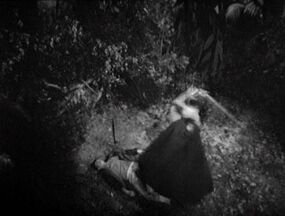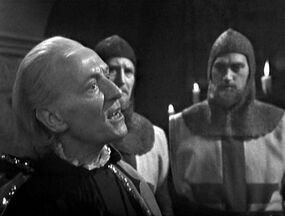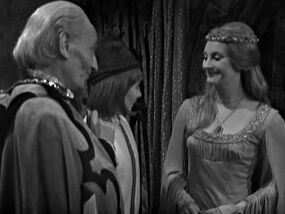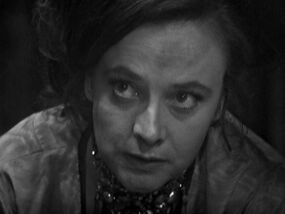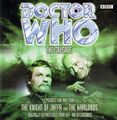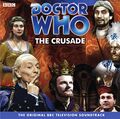The Crusade (TV story)
The Crusade was the sixth serial of season 2 of Doctor Who. It was the last story that Whitaker wrote for Hartnell and the first story to be directed by Douglas Camfield in its entirety. Currently, only the first and third episodes, "The Lion" and "The Wheel of Fortune", are not lost, making The Crusade the only serial from the second season to contain missing episodes.
Most of the actors in this story had either just been in Doctor Who, or were just about to do so, namely: Gabor Baraker, Zohra Sehgal, Walter Randall, Jean Marsh, Reg Pritchard and Bernard Kay. The latter was a common practice at the time. Nicholas Courtney was briefly considered as a replacement for Julian Glover and Jean Marsh would go on to play Sara Kingdom.
This story was also notable due to the Doctor's actions. He justifies stealing clothes based on the fact that they were already stolen. He talks about how he admires bravery and hates fools. Strangely, he tries to push through King Richard's peace plan, even though he must know it won't work. In a sort of in-joke, The Web Planet saw Ian comment on ants eating through a house while being threatened by the ant-like Zarbi and here he is about to be eaten by a colony.
Synopsis
The TARDIS arrives in 12th century Palestine where a holy war is in progress between the forces of King Richard the Lionheart and the Saracen ruler Saladin. Barbara is abducted in a Saracen ambush and the Doctor, Ian and Vicki make their way to King Richard's palace in the city of Jaffa.
Plot
The Lion (1)
The TARDIS materialises in 12th century Jaffa in the same forest King Richard the Lionheart and his associates are inhabiting. As they talk about sport and tactics, they are beset by Saracens. A skirmish ensues which soon spills into where the Doctor and his companions are. Ian is forced to take up arms and fight off one of the Saracens with the help of the Doctor, but in the melee, Barbara is seized by the heathens and taken hostage. The travellers stumble across William de Tornebu, who has been wounded in the skirmish and look after him, protecting him from the Saracen onslaught. They call for Barbara, but though she can hear them she has been bound and gagged and is taken away. Meanwhile, in another part of the wood, another companion of the king, William des Preaux, is surrounded by Saracens. He tells them that he is Richard as he knows they have orders to return the king to the leader of the Saracens, Saladin. By this time the Doctor has deduced where they are and what time period they are in just before Ian discovers that Barbara is no longer with them. He goes to look for her but to no avail. The Doctor, Ian, and Vicki agree to take the wounded de Tornebu back to Richard's court. In order to fit in they have to find new clothes so the Doctor and Vicki decide to go look for them while Ian looks after de Tornebu and Richard's belt.
Barbara awakes to find herself released and in the camp of the Saracens. She is greeted by des Preaux, who informs her of the trick he is pulling with regards to him being Richard and decides that in order to also protect Barbara it would be expedient for her to pretend to be Joanna, Richard's sister. At this point El Akir, a senior member of the Saracen army interrupts the two prisoners and insults them, much to the anger of Des Preaux, who knows that Saladin demands the utmost respect for his prisoners. El Akir informs the prisoners that they are to be presented to Saphadin, Saladin's brother.
The Doctor and Vicki have sneaked into the centre of Jaffa in order to acquire some more befitting clothes. They take advantage of a transaction between the shopkeeper and a Saracen soldier who has stolen some clothes from the English forces to steal the clothes themselves.
El Akir presents Barbara and des Preaux to Saphadin, who responds angrily, seeing straight through the falsehood of the two prisoners' supposed identities. They are interrupted by Saladin. El Akir, eager to shift the blame from his case of mistaken identities, begins to suggest the prisoners could be used for entertainment purposes, stating that Barbara could be forced to walk over hot coals. Saladin asks Barbara whether she would find this acceptable, to which she responds in the negative. A shamed El Akir is told to allow the two prisoners all liberties in the camp except liberty itself.
The Doctor has brought de Tornebu to the court of King Richard, who is angry at the loss of life due to the Saracen siege and therefore treats the TARDIS crew very curtly. Ian, anxious to rescue Barbara, asks for the king's help in rescuing her, but Richard, angry that Saladin enforces underhanded methods of warfare as well as the fact that his brother John seems to be willing to trade with Saladin, says that he refuses any contact with Saladin from here on in and therefore will not extend any help in the return of Barbara.
The Knight of Jaffa (2)
De Tornebu and the Doctor are able to convince the King to change his mind by playing up the embarrassment Saladin will feel when it's revealed he has not actually captured the King. Richard is amused and asks the Doctor to join his court. They are interrupted when the King's sister Joanna enters the court and is concerned about her brother. The Doctor, Vicki and Ian bow before her as the King introduces and commemorates them for their courage. The Doctor, Ian and Vicki bow to the King and exit the court. Richard and Joanna later discuss war and peace.
El Akir plots to gain his revenge on Barbara, and Genoese merchant Luigi Ferrigo willingly inserts himself into the situation, hoping to profit financially. He pretends to help Barbara escape, but in fact, delivers her into El Akir's hands. El Akir rides away with her to Lydda.
Joanna befriends the Doctor and "Victor" (the Doctor decides to disguise Vicki for her safety). But the two travellers soon find themselves accused of theft by the Chamberlain and by the shopkeeper from whom they did indeed steal clothes. However, the man who originally stole the clothes and delivered them to the shopkeeper is revealed to be under the chamberlain's command, and the Doctor is cleared of any crime.
Ian is knighted and sent to Saladin's court to both request the release of des Preaux and Barbara and to offer the hand of the real Lady Joanna in marriage to Saphadin.
Ferrigo is allowed an audience with the Sultan and his brother but in the presence of des Preaux admits to helping kidnap Barbara. Barbara, meanwhile, has escaped from El Akir and flees through the streets of Lydda as two guards close in.
The Wheel of Fortune (3)
Barbara is taken in by Haroun ed-Din. He is sympathetic because El Akir killed his wife and son and kidnapped his daughter. The truth about Vicki is revealed to Joanna, but the Doctor and Vicki are able to placate her and Vicki is offered her protection.
Haroun leaves his remaining daughter Safiya with Barbara as he scouts around, but is knocked out by El Akir's patrolling men. They search Haroun's house, and while protecting Safiya, Barbara attempts to escape but she's recaptured and returned to El Akir. Ian, on the way from Saladin's court to Jaffa, is attacked by bandits and knocked out.
King Richard announces his plans to his assembled nobles, including the blood-thirsty Earl of Leicester. The earl is appalled, and he and the Doctor argue eloquently about the plans. The king's mind is made up, but the earl becomes suspicious of the Doctor.
The Sultan tentatively agrees to the King's plan, to the pleasure of his brother, but is suspicious and plans to be ready for any duplicity.
When Joanna learns of her brother's marriage plans for her, the Doctor is politically caught between the two royals. She is infuriated and tells her brother she will never consent. The King turns on the Doctor, believing him to have exposed his plan prematurely, and orders them out of his sight.
Barbara is brought to El Akir where he taunts her with threats of torture, saying that the only pleasure she has left is death — which will be a long way away.
The Warlords (4)
El Akir offers his guards gold to do whatever they like to Barbara. Barbara knocks the gold on the floor, and whilst the guards scramble to pick it up Barbara makes her exit. El Akir and the guards follow her and are met by only El Akir's harem, who tell him they haven't seen Barbara. Once El Akir is out of sight they tell Barbara to come out from her hiding place. They inform Barbara they all hate El Akir and would love to see her escape. Barbara befriends Haroun's daughter and informs her that her father and sister are safe and well.
When Ian awakes, he finds himself tied by his hands and feet in the middle of the desert by a thief named Ibrahim. Ibrahim tells Ian that unless he pays him a ransom he will leave him to burn to death in the desert. When Ian says he has no money Ibrahim smothers honey on his face and chest and goes to wait in the shade until the threat of the oncoming horde of ants makes Ian reveal where his money is hidden.
Back in the fortress of Richard, Leicester is accusing the Doctor and Vicki of treason for their deceit towards Richard. The king enters and tells Leicester to prepare the troops for battle. Richard apologises to the Doctor and Vicki for being cross at them previously, stating he now knows it was Leicester who poisoned the mind of Joanna rather than them. He says that he cannot banish Leicester as he holds too much sway with the soldiers. The king further warns that the Doctor has made an enemy in Leicester and reluctantly advices him and Vicki to leave the court until things have settled. Heeding the king's advice, the two travellers decide that now is the best time to go to the TARDIS and wait for the others. Vicki is sad to hear that Richard's plans will ultimately end in defeat, but the Doctor tells her history must take its proper course. Meanwhile, Leicester speaks to one of his advisors and speculates that the Doctor and Vicki must be traitors, and even speculates that they may be devils or witches. The advisor is told to keep a watch on the pair of them.
Back in the desert, Ian has devised a plan to escape from Ibrahim. He tells him that the money is in his boot. When Ibrahim loosens the binds on one of his feet Ian kicks Ibrahim to the ground and frees himself. He makes Ibrahim take him to Lydda under pain of death.
Unbeknownst to Barbara and the rest of the harem one of their number has betrayed them to El Akir, who takes them by surprise in order to discover Barbara. Just as Barbara is about to be slain for her treachery, Haroun enters and kills El Akir, and he is followed by Ian, who helps the women escape. Ian pays off Ibrahim with El Akir's money and leaves for Jaffa on his horses.
As the Doctor and Vicki slink away to the TARDIS, they are discovered by Leicester and his soldiers. Leicester sees this as an admission of their guilt and vows to kill them for treason. However, he is interrupted by the return of Ian, who states that he is Sir Ian of Jaffa and has a higher claim on the Doctor's head — stating that he killed a number of his troops. Leicester bows to this greater claim and the travellers escape together in the TARDIS. The TARDIS's departure is witnessed by Leicester and his men, who are left believing that the brave Sir Ian has been spirited away by sorcerers — and vow never to tell what they have seen.
Meanwhile, the Doctor and his companions have not been travelling long when an unexplained power failure results in the interior lights starting to dim ominously. The crew suddenly freeze into immobility, and only the control console remains functioning and illuminated, with its light playing across the faces of the frozen figures before it...
Cast
- Dr. Who - William Hartnell
- Ian Chesterton - William Russell
- Barbara Wright - Jacqueline Hill
- Vicki - Maureen O'Brien
- Richard the Lionheart - Julian Glover
- Saladin - Bernard Kay
- Saphadin - Roger Avon
- El Akir - Walter Randall
- William des Preaux - John Flint
- William de Tornebu - Bruce Wightman
- Ben Daheer - Reg Pritchard
- Thatcher - Tony Caunter
- Reynier de Marun - David Anderson
- Saracen warrior - Derek Ware
- Saracen warrior - Valentino Musetti
- Saracen warrior - Chris Konyils
- Saracen warrior - Raymond Novak
- Joanna - Jean Marsh
- Chamberlain - Robert Lankesheer
- Sheyrah - Zohra Sehgal
- Luigi Ferrigo - Gabor Baraker
- Haroun - George Little
- Earl of Leicester - John Bay
- Safiya - Petra Markham
- Turkish bandit - David Brewster
- Saracen warrior - Anthony Colby
- Maimuna - Sandra Hampton
- Fatima - Viviane Sorrél
- Hafsa - Diane Mckenzie
- Ibrahim - Tutte Lemkow
- Man-At-Arms - Billy Cornelius
Uncredited cast
- Saracen Warriors - Edward Haroutunian, Oscar James, Peter Johnson, Sam Shendhary, Roy Fletcher, Roy Stewart, Abbas Haschen
- Richard’s Squire - Andy Brewer
- Falconer - John Holmes
- Priest - Rikki Patterson
- Men-at-Arms - Henry Garcia, John Galahar, Michael Guest, Walter Mann
- Ladies in Waiting - Carole Brett, Maureen Lane
- Knights - Michael Hart, Winston Marsh
- Double for Ian’s arm - Viktors Ritelis
- Concubines - Cicely Joseph, Mei Ling, Cleo Sylvestre, Evelyn Ong (all DWM 259)
Crew
- Writer - David Whitaker
- Director - Douglas Camfield
- Producer - Verity Lambert
- Script Editor - Dennis Spooner
- Designer - Barry Newbery
- Assistant Floor Manager - Michael Briant
- Costumes - Daphne Dare
- Fight Arranger - Derek Ware
- Film Cameraman - Peter Hamilton
- Film Editor - Pam Bosworth
- Incidental Music - Dudley Simpson
- Make-Up - Sonia Markham
- Production Assistant - Viktors Ritelis
- Special Sound - Brian Hodgson
- Studio Lighting - Ralph Walton
- Studio Sound - Brian Hiles
- Theme Arrangement - Delia Derbyshire
- Title Music - Ron Grainer
Uncredited crew
- Floor Assistant - Trevor Beckett (REF: The Crusade)
- Technical Manager - Mark Lewis (REF: The Crusade)
- Vision Mixer - John Lopes (REF: The Crusade)
- Grams Operator - Nick Ware (REF: The Crusade)
- Director's Assistant - Shirley Coward (INFO: The Crusade)
References
- Barbara plans to tell Saladin the stories of Romeo and Juliet, Gulliver's Travels and Hans Christian Andersen's fairy tales.
- Richard's party uses hawks for hunting.
- El Akir offers metal coins to Barbara.
Story notes
- This story was originally entitled The Saracen Hordes. The working titles for "The Knight of Jaffa", "The Wheel of Fortune" and "The Warlords" were "Damsel in Distress", "Changing Fortunes" and "The Knight of Jaffa" respectively.
- Only the first and third episodes of this four-part story, "The Lion" and "The Wheel of Fortune", exist in the BBC Archives as 16mm telerecordings. However, complete audio recordings of all four episodes exist. Notably, episode two of this story ("The Knight of Jaffa") breaks a 44-episode long streak of "moving" (i.e. available in a watchable form other than telesnaps) episodes dating back to "The Sea of Death".
- "The Lion" was found in New Zealand by film collector Bruce Grenville sometime well before 1998 and languished amidst Grenville's vast 16mm film collection for several years. In 1998, Doctor Who fan Neil Lambess asked Grenville if he had any Doctor Who film in his collection, and when Grenville said that he had something called "The Lion", Lambess realised he might have a missing episode. He brought his friend Paul Scoones to Grenville's home to videotape the screening, just in case Grenville had the real episode. After it was determined that Grenville's print was genuine, he readily agreed to have it sent to the BBC for copying. Scoones shipped it to the BBC Film and Videotape Library, and in 1999 the BBC made a Digi-Beta print of "The Lion", and returned the original print to Grenville. The story of the recovery of "The Lion" generated a great deal of press interest in the United Kingdom. As a result, Bruce Grenville appeared on one of BBC1's most-watched programmes, one of the variations of The National Lottery Draws, to tell his tale. To date, The Crusade remains the only second season story to have missing episodes.
- Telesnaps by John Cura for this story exist in the hands of private collectors, and several enlarged telesnaps also exist.
- William Hartnell demanded that dialogue implying an incestuous relationship between Richard and Joanna be removed, as he felt it was inappropriate for a family series. Julian Glover and Jean Marsh were aware of the original intentions and were keen to reinstate the sensual undertones through their performance. However, they were deterred from doing so by Verity Lambert who advised them, "Don't think I don't know what you're doing."
- Adrienne Hill was in the running for Joanna, but Douglas Camfield and Verity Lambert felt that she was too short.
- It was during the production of this serial that Verity Lambert decided to leave the series.
- William Russell only appears briefly in "The Wheel of Fortune" in a pre-recorded segment as the actor was on holiday during filming. Russell was also scheduled to film the scene where an army of ants crawls up Ian's arm. Russell refused to participate in this shot, and production assistant Viktors Ritelis agreed to double for him.
- The Radio Times programme listing for "The Wheel of Fortune" was accompanied in certain regions by a small black-and-white photograph of the Doctor in the marketplace, with the accompanying caption "William Hartnell as Dr. Who, who continues his adventure among the Crusaders and Saracens this evening at 5.40". (original published text)
- This story has been noted for its non-stereotypical treatment of the two opposing leaders. Saladin (played by Bernard Kay) is portrayed as calculating but compassionate, while King Richard I is portrayed as volatile and at times childish. Doctor Who also pronounces Saladin's name correctly, which is unusual for media depictions of him in the West.
- No exact date was given in the story, however the novelisation has the Doctor estimate the date to be between 1190 and 1192.
- Julian Glover's costume is a modified version of the one Mark Eden wore as Marco Polo.
- Julian Glover didn't enjoy working with William Hartnell. He noted on the DVD commentary that William Russell and Jacqueline Hill would make guest casts welcome as Hartnell "wasn't very good at that", and describes him as "cold" towards himself and Jean Marsh. "I don’t know whether he was insecure or not, but he was very difficult to work with. God rest his soul, but he was very difficult. I suppose it was insecurity, he couldn’t bear to be upstaged, he couldn’t bear not to be in the centre. It was extraordinary casting in that part, I mean, if you think of all those films where he played military people, and all that. He was absolutely wonderful playing those stern military types. That was his strength, playing union men, playing representatives of working class bodies, and so it was extraordinary that he was cast as Doctor Who. That’s probably the reason Bill Hartnell, as has been suggested, felt insecure. That was the reason for it; he felt like a fish out of water to start with, and he was determined that he should win, and my God, he did win. He was personally responsible for the success of that series, and why it’s still going today. I don’t deny that, but he wasn’t easy, and I had to just swallow it, as he was the governor, and Doug said, 'No, don’t upset him.' My background was, at the time, a bit la-de-da for him, with the Royal Shakespeare company, and all that Shakespeare stuff. Unlike Roger Moore, who had never done anything like that at all in his life, and just used to call me 'Mr National Theatre', and we laughed all the time. He found it amusing, but William Hartnell didn’t".
- David Whitaker held this story up as his finest technical achievement. Douglas Camfield claimed that he didn't have to change a single line. "The Crusade is the story that I am technically proudest of. It achieved almost to a word what I set out to depict and was people with some interestingly real characters. I became fascinated with the relationship between Richard and his sister, which was almost incestuous in its intensity. I relished the dialogue that the story allowed me to write, and the period itself was so interesting that it became almost a labour of love to produce a script worth of the colour and depth of drama that had inspired it, within the limits of the budget - and what was permissible for that time slot and indeed that time, when television was not the liberated lady it has since become. The final satisfaction came with the truly inspired acting and direction — Douglas Camfield worked my words into some beautiful and taut images".
- Ian is made a knight. William Russell had previously starred in The Adventures of Sir Lancelot.
- Camera rehearsals were disrupted when Tutte Lemkow deeply cut his finger with his knife and had to be taken to the hospital for tetanus injections.
- Jacqueline Hill enjoyed working with Douglas Camfield again, and Maureen O'Brien found him dynamic; William Hartnell was pleased to work with a director he liked.
- Barry Newbery used the 1962 volume Behind the Veil of Arabia by Jørgen Bitsch for inspiration. The images of the original architecture from the Crusades were particularly useful.
- The props adorning the sets were hired from Old Times Props House.
- This was the last collaboration between Douglas Camfield and Dudley Simpson; a falling out between the two shortly after the serial's airing led to Camfield's refusal to hire Simpson. When he became aware that he had misjudged Simpson many years later, Camfield intended to hire him again, but died before doing so.
- Douglas Camfield cast Julian Glover after seeing him in An Age of Kings.
- Jean Marsh had previously appeared opposite William Hartnell in the film Will Any Gentleman...?, where she met her husband Jon Pertwee.
- Walter Randall was cast as El Akir, having been good friends with Douglas Camfield since working together on Gerry Halliday in 1951.
- For a shot in "The Warlords" in which ants advance upon Ian, assistant floor manager Michael E. Briant arranged for the supply of 75 black ants from London Zoo.
- For "The Lion", a trained hawk was supplied by John Holmes of the Formakin Animal Centre in Benson, Oxfordshire.
- Douglas Camfield arranged for a cow carcass to be present during recording in order to achieve particular shots through the rotting rib cage; the carcass attracted flies and emitted an odour beneath the studio lights.
- Julian Glover would later play Richard the Lionheart again in Ivanhoe (1982), which was also directed by Douglas Camfield.
- Several costumes and bits of set dressing were recycled from Beckett. The costume worn by Julian Glover as Richard the Lionheart was previously worn by Peter O'Toole, who played Richard's father Henry II.[1]
Ratings
- "The Lion" - 10.5 million viewers
- "The Knight of Jaffa" - 8.5 million viewers
- "The Wheel of Fortune" - 9.0 million viewers
- "The Warlords" - 9.5 million viewers
Myths
- The Doctor quotes William Shakespeare, and Barbara quotes Percy Shelley. (Although the archived BBC Episode Guide mentions this idea, crediting Ian with quoting Shakespeare, these lines do not occur in the recorded programme.)
- Ian rescues Barbara from El Akir by climbing up a tree and over a balcony. (This element of the story was introduced in the novelisation.)
- The story was never offered for distribution in Muslim countries to avoid offence. (Nigeria, Sierra Leone and Mauritius have substantial Muslim communities and all of them screened the story. While it is true The Crusade was not offered as part of the distribution package dubbed into Arabic, no other stories beyond The Rescue were either.)
Filming locations
Production errors
- In "The Lion", Julian Glover refers to Sir William des Preaux as "Sir Richard."
- At the end of "The Wheel of Fortune", after El Akir says "And death is very far away" to Barbara, you can hear someone call "Cue" just before the credits roll.
Continuity
- The Doctor tells Vicki that time must be allowed to run its course, as he had previously told Barbara. (TV: The Aztecs)
- Barbara makes reference to several previous adventures when talking to Saladin. She tells him about England in the far future, (TV: The Dalek Invasion of Earth) her meeting with Nero in July 64 (TV: The Romans) and the Zarbi on Vortis. (TV: The Web Planet)
- The Doctor wishes that he was a knight, to which Vicki remarks, "That will be the day." He is eventually knighted during his tenth incarnation as "Sir Doctor of TARDIS" by Queen Victoria in 1879. (TV: Tooth and Claw)
- Ian later introduces himself to Sir Robert de Wensley as "Sir Ian of Jaffa" in Sonning Palace in 1400. (AUDIO: The Doctor's Tale)
- The Fifth Doctor later meets a robot who he at first mistakenly believes to be King John, the younger brother of Richard the Lionheart and Princess Joanna, in March 1215. (TV: The King's Demons)
- Vicki later disguised herself as a boy named Victor once again when she and the Doctor met King James I of England in London in November 1605. (PROSE: The Plotters) Polly Wright later did the same thing in Cornwall in the 17th century. (TV: The Smugglers) Furthermore, the Fifth Doctor's companions Peri Brown and Erimem were later forced by King Richard III of England to disguise themselves as his nephews King Edward V and Richard, Duke of York, the Princes in the Tower, from 1483 to 1485. (AUDIO: The Kingmaker)
- The Third Doctor later recalled Richard the Lionheart as being a "lovely chap". (AUDIO: The Warren Legacy)
Releases
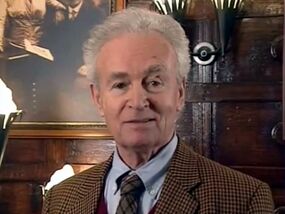
Since the story does not exist in its complete form, video releases feature William Russell appearing as Ian in an introduction before episodes of the story. In these segments, Ian has aged considerably, which may contradict the suggestion made by Sarah Jane Smith in The Sarah Jane Adventures television story Death of the Doctor that Barbara and Ian had not aged since the 1960s. Sarah Jane, however, noted that this was only something as "rumour had it". It's also possible that they were just ageing very slowly, and the recounting took place many years after "Death of the Doctor". Ian stated in the audio story The Five Companions that he and Steven were more than a little bit older when he was brought into the alternative Death Zone.
DVD releases
The two surviving episodes of this story were released alongside the audio of the two lost episodes in the Doctor Who: Lost in Time boxset.
The two missing episodes, "The Knight of Jaffa" and "The Warlords", are in audio form only, and are as broadcast, i.e. without linking narration.
- Editing of the surviving episodes DVD release was completed by the Doctor Who Restoration Team.
Blu-ray releases
The story was released on Blu-ray in the UK on 5 December 2022, as part of the box set The Collection: Season Two. This included a reconstruction of the missing second and fourth episodes, using the original, remastered soundtrack and stills.
Video releases
"The Wheel of Fortune" was released in 1991 as part of the Hartnell Years video; this being, at the time, the only episode of the story known to exist.
"The Lion" and "The Wheel of Fortune" were released as Doctor Who: The Crusade/The Space Museum.
- UK Release: July 1999 / US Release: January 2000
- PAL - BBC Video BBCV6805
- NTSC - CBS/FOX Video 2000020
- NTSC - Warner Video E1399
- William Russell provides in-character narration for "The Knight of Jaffa" and "The Warlords" on the later release.
Audio release
The audio version of episodes two and four was released on CD along with the story's VHS release in 1999. This release contained no narration.
A reissue of the audio release of the television story was released in 2005 by BBC Audiobooks with linking narration by William Russell on 2 CDs plus a bonus interview with William Russell as part of the Doctor Who TV soundtrack releases. This was re-released in 2010 as part of the box set Doctor Who: The Lost TV Episodes - Collection One.
Script book
- Main article: Doctor Who The Scripts: The Crusade
In November 1994, Titan Books published the scripts for the serial as part of its Doctor Who: The Scripts line of books. It was the last book of this series.
External links
- The Crusade at the BBC's official site (with video clips)
- The Crusade at RadioTimes
- The Crusade at BroaDWcast
- BBC - Doctor Who - Classic Series - Photonovels - The Crusade
- The Crusade at the Doctor Who Reference Guide
- The Crusade at Shannon Sullivan's A Brief History of Time (Travel)
- Loose Canon Productions reconstruction page for The Crusade
- Encyclopaedia of Fantastic Film and Television entry for The Crusade
